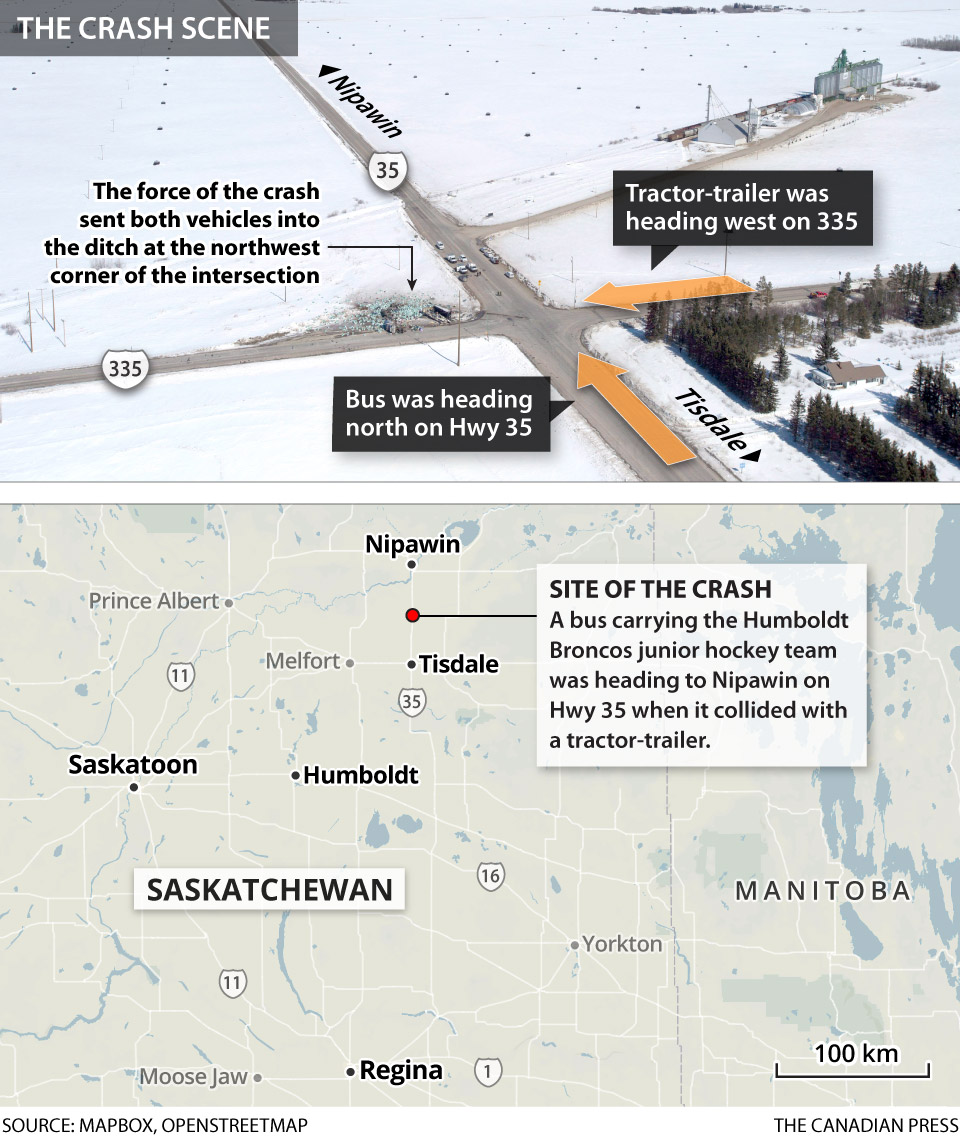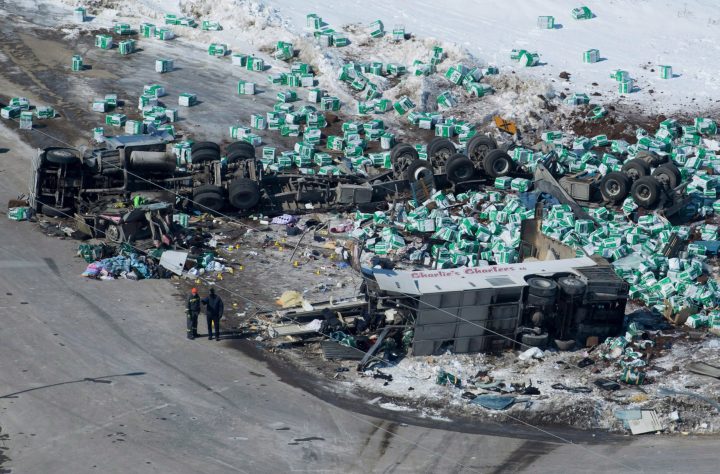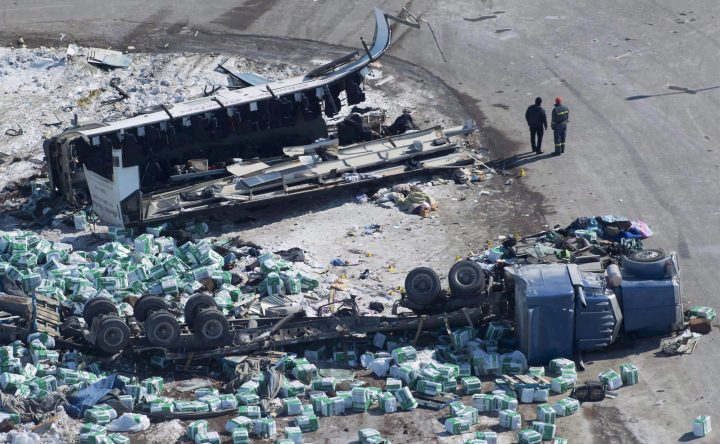The RCMP forensics report from the disastrous Humboldt Broncos bus crash shows the vehicle was torn into three pieces after it collided with the trailer of a transport truck, resulting in 16 deaths.

Police shared the contents of their forensics report with journalists on Tuesday, on the second day of a sentencing hearing for the semi-truck driver who pleaded guilty to causing the crash.
Jaskirat Singh Sidhu was behind the wheel of the transport truck when it blew through a stop sign and collided with the Broncos’ bus at full speed on April 6, 2018. Fourteen of the 29 people on the bus were killed in the crash. Another two later died of their injuries.
Sidhu has pleaded guilty to 29 counts of dangerous driving.
WATCH BELOW: Jaskirat Singh Sidhu arrives in court for sentencing

The forensics report found that Sidhu was entirely at fault in the collision, and that he should have seen and heeded a stop sign at the intersection where the crash occurred.
The truck, which was hauling two flatbed trailers loaded with peat moss, was completely across the intersection of Highways 35 and 335 when the collision occurred. The bus struck the middle of the lead trailer at 96-107 kilometres an hour, despite the bus driver’s efforts to brake and avoid the crash.
The two vehicles crushed together, broke apart and were forced downward into the asphalt as they skidded out the intersection toward a ditch and a field on the northwest side. Both vehicles flipped over before they came to rest.

Here’s what the RCMP forensics team learned when they examined the wreckage.

Get breaking National news
The bus sustained massive damage
The front of the bus was torn away from the rest of the vehicle, leaving the driver and passengers at the front with no chance to survive.
“Everything above the floor level of the bus had been sheared off – the roof, pillars, dash, steering column, and the driver’s seat itself, were all gone,” the report said.
Parts of the floor and several seats near the front were completely ripped away. The right side of the bus was pushed inward. The crash also destroyed the toilet at the back of the bus and scattered pieces of it across the area.
The main section of the bus came to rest on its right side at the edge of the highway, with the roof 10 metres away and a section of the front less than 1 metre away from the semi-truck.
“The damage on the bus was consistent with a massive impact that hit the front of the bus while moving right to left,” the report said.
Forensics teams found several personal items, cellphones, wallets, keys, clothes and hockey bags in the wreckage and around the intersection. They also found one half-empty bottle of rum at the back of the bus.
The transport truck sustained significant damage
Sidhu’s semi-truck flipped onto its right side in the crash, causing significant damage to that side of the vehicle. The other side was virtually undamaged and the cab of the vehicle was largely intact, although part of the sleeper cab was dented and buckled. The entire cab was broken off its mounts but the windows were not damaged.
No drugs or alcohol were found inside the cab.
The lead trailer involved in the crash was misshapen and bent downward from the collision, and its underside was extensively damaged. The rear trailer was also bent and deformed, but to a lesser degree.
The truck came to a stop on the edge of Highway 335, with its twisted-up trailer hanging off in the field parallel to the main body of the bus.
“The vehicles’ final rest positions revealed that they both experienced a rollover after the primary impact,” the report said.
The truck’s cargo of peat moss spilled all over the field and into a ditch on the northwest side.
Most of the tire marks were caused by the crash
Investigators found that the tire marks and gouges in the road were caused during the collision, as both vehicles skidded toward the northwest corner of the intersection.
Forensic analysis found that the truck was travelling at 86-96 kilometres an hour through the intersection, a speed that would have been impossible if it had stopped at the nearby stop sign. The bus was doing 98-108 kilometres an hour when the driver hit the brakes 24 metres before the intersection. The bus was not facing a stop sign.
WATCH BELOW: Investigators recreate conditions in Humboldt crash

Both vehicles were in good working order at the time of the crash, based on an analysis by two safety experts.
The road conditions were clear at the time of the collision and the sun would not have been in the truck driver’s eyes.
The truck driver passed five signs indicating an intersection
Investigators identified five signs along the truck driver’s route that indicated an intersection was ahead, including a “stop sign ahead” sign 301 metres before the actual stop sign. The other three signs indicated a junction was ahead.
All signs on both roads indicated the bus driver had the right of way.
WATCH BELOW: 13 recommendations offered for improving safety at Humboldt crash intersection

The report suggests the truck driver was travelling at full speed, but he could have narrowly avoided the collision if he had hit the brakes at the second-last sign 104 metres before the intersection.
Several trees would have obscured the truck driver’s view of the bus at certain points, but they would have been visible to each other 20 and two seconds before the impact. The report suggests the bus driver saw the truck in those few seconds before the crash and tried to brake.
The truck driver racked up dozens of violations in his logbook before the crash
Sidhu’s logbook showed 51 violations related to documenting his trip hours, along with 19 violations related to provincial trip inspection regulations from March 26 to April 6.
WATCH BELOW: Guilty plea in Humboldt crash spares families from reliving their grief

Provincial highway safety officials suggested Sidhu would have been taken out of service for 72 hours if he had been inspected prior to the collision, because he was missing records for March 30, March 31 and April 6. He also did not have documentation for his hours on the day of the crash.
Investigators found no violations in bus driver Glen Doerksen’s logbook.
- The Bank of Canada says these are the 3 warning signs for mortgage default
- Carney says Canadian military participation in Middle East war can’t be ruled out
- ‘Buy Canadian’ policy likely to cost taxpayers $12 billion yearly: study
- Canadian companies exporting only to U.S. cut nearly in half, data shows










Comments
Comments closed.
Due to the sensitive and/or legal subject matter of some of the content on globalnews.ca, we reserve the ability to disable comments from time to time.
Please see our Commenting Policy for more.